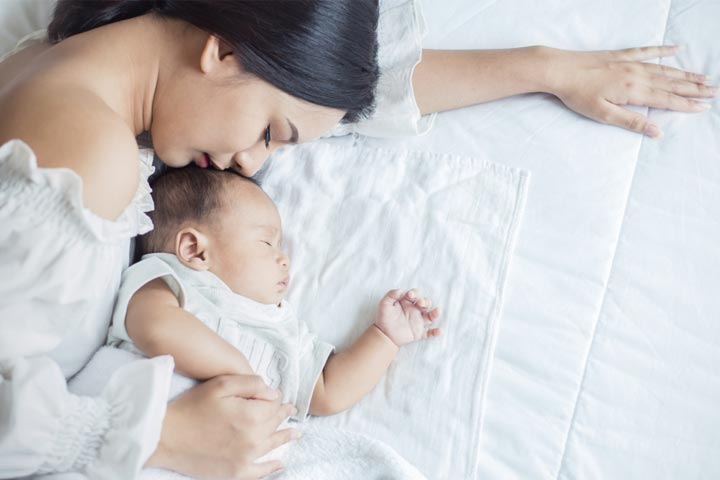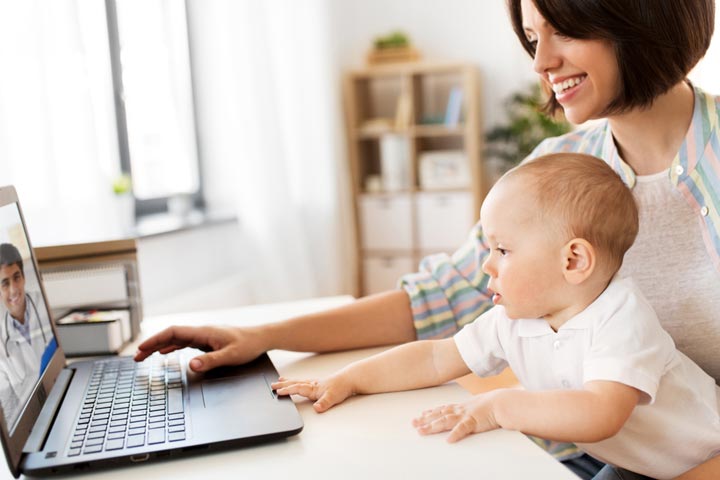
Image: Shutterstock
Being the parent of a newborn is quite a stressful experience for most parents. You are constantly worrying about them and wondering if they are hungry, thirsty, sleepy or need anything. The first few months after a baby is born is possibly the most stressful time for a parent because your baby cries the most during these times. You’re a new parent so you’re still figuring out why they are crying and this can be scary sometimes. But most parents figure out their baby’s language and slowly start to understand why their baby is crying. While this can be a scary experience as is, during these unprecedented times, parents are especially worried for their newborns and their ability to cope with the global pandemic.
Research has shown that there is minimal chance of the virus affecting the baby prepartum. Babies are likely to be affected by respiratory droplets during the postnatal period. It could be transmitted by the mother, caregivers or any visitors if they have the virus. For this reason, it is recommended that newborn babies should be separated temporarily from their mothers who have been confirmed or suspected to have COVID-19 to reduce the risk of transmission (1).
It can be especially challenging during these times for parents who have newborn babies. During normal times, relatives, grandparents, or other family members can possibly help out the new parents. But what do you do in a situation where there is a global pandemic and movement is restricted? Here are a few tips on how to cope with a new baby during this virus outbreak:
1. Soothe The Baby
All babies want when they are crying is to be comforted. So if you’ve fed them, bathed them and they have clean diapers, you just need to hold them and soothe them until they stop crying. But every baby is different so you may have to try different things to get them to stop crying. You could try to hold the baby close to your bosom and gently rock them from side to side. You could also try to sing for them and swaddle them so they feel safe.
2. Take Care Of Yourself
Being a mother can be quite overwhelming but it is vital that you take care of yourself while also taking care of your baby. You must get lots of rest and try to sleep when the baby sleeps. Let your partner or other family members watch the baby while you take some time for yourself. Even a cup of tea, a shower or a few hours with some music could help you relax.
3. Stay In Touch
It is important to maintain social distancing during this global pandemic and that can be isolating. So, ensure that you stay in touch with your loved ones through video calls and chats so that you feel a sense of community. Support is quite comforting, even if it’s virtual. Sometimes when things get overwhelming, all you need to do is vent to someone who understands you and you will start to feel better.
4. Ask For Help
Some of you may hesitate to ask for help but if you have friends and family members who are offering to help, by all means, take them up on the offer. You might not have the liberty to take their help physically due to the restrictions and risk factors. But you could always ask them to pick up diapers for your baby or maybe they could walk your dog. Every tiny bit of help is much appreciated when it comes to being new parents.
5. Call Your Pediatrician
If you are doubtful about anything or want to seek advice for matters relating to you or your baby, do not hesitate to call your pediatrician. They are the best source of information and understanding for your baby and you. They can also help with postpartum depression. Therefore, always keep them in mind and call them for advice.
Being a new parent comes with its own set of challenges. It might be scarier to have a baby during times like these but with a little extra caution and a whole lot of love and care, you will have a happy and healthy baby and get through your anxiety and worry. Parents, stay home and stay safe!

















